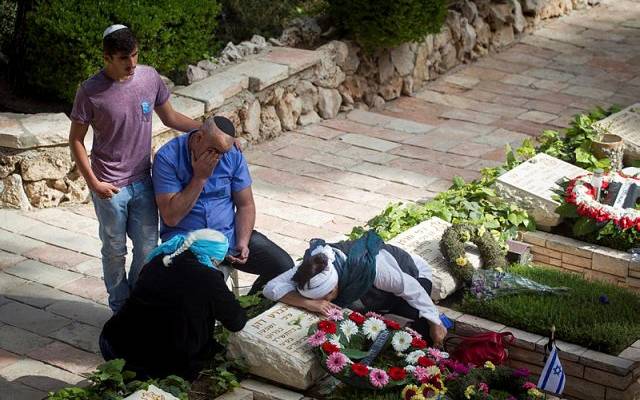For the families of fallen Israeli soldiers and terror victims, loss and loneliness are the norm. Yet this past weekend 130 bereaved families gathered together for Shabbat in a Jerusalem hotel to share both grief and comfort in advance of Yom Hazikaron, Israel’s national Memorial Day, on Wednesday.
“It may sound strange, but this Shabbat brought me back to the time when life was good and ‘normal’,” Ada Rubel, mother of Bnaya Rubel, an 18-year old paratrooper killed during Operation Protective Edge in the summer of 2014, told Tazpit Press Service (TPS).
“It helps feel normal to be surrounded by the families that have experienced the same thing, and to have an opportunity to talk about everything with people who know what you’ve been through has a therapeutic effect,” Rubel said.
The event was sponsored by One Family, an organization devoted to helping the families of terror victims. Over the past 15 years, One Family has aided 4,000 families that have suffered bereavement or injury from terror, aided by 500 volunteers, 40 staff members, and three national centers.
The Shabbat gatherings before Memorial Day have been taking place for 11 years now. Each year brings a new group of families struck by tragedy that the others know so well.
“When we lost our son in a terror attack 14 years ago, it helped a lot to talk with people who had experienced this before us. And now we try to do the same to the ‘newcomers’,” Yossi Rund, whose 18-year-old son Erez was killed by Palestinian terrorists in 2002, told TPS.
“We tell the parents who have lost their child recently about our experience, and it helps them to see that you can live after this, and you can live with this. You need much strength, but you can cope.”
During the First Years Your Eyes Are Full of Tears
Rund explained that although Memorial Day is hard on bereaved parents, it can also be a relief, because “it is a chance to cry”.
“You know, in the beginning you cry all the time. During the first year after the death your eyes are full of tears,” Rund said. “But you need to be strong in the eyes of your other kids, and in the eyes of the public, because people look at you, and they want to see that you can manage. And eventually it has become hard for me to cry. But the pain is still inside, it has not gone. When people come to you to talk about your son, it helps you cry, and this pain leaves the body for a while.”
“For the bereaved families, it is one long memory, lasting each day, every day, all year long,” One Family CEO Shantal Belzberg said. “For them, Memorial Day, when they open their hearts for us in order to allow us to connect as well, is a difficult day which intensifies the existing pain and hardship.”
“It’s amazing to see how the families strengthen each other,” Belzberg added. “It’s very special how they lift the spirits of others who have suffered in the same way. It shows their real power. Anyone watching from outside cannot help but be moved by it.”
By: Anna Rudnitsky/TPS










